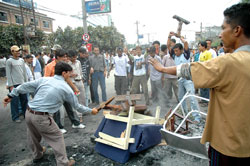. When a not unheard of case of negligence transpired at a private nursing home in New Baneswor, youngsters broke windows and burned hospital furniture on the street.
. Even after the issue of the unfortunate death of a chronically ill patient was amicably resolved between the aggrieved family and the management, the restive crowd refused to budge. It had tasted blood and wanted more.
. Traffic along the Ring Road came to a complete halt for two consecutive days over a minor fracas between the driver of a microbus and a traffic cop.
. Birganj is closed for two days by regressive forces whipping up public emotion against parliament's decision to turn Nepal into a secular state.
. On average, the Mahendra Highway is closed by irate mobs for four hours or more every day because of a vehicle hitting a pedestrian at some point between Mechi and Mahakali.
|
|
What is happening? While the government and the Maoists are trying to resolve the conflict, the country seems to be on a short fuse. While leaders of the ruling alliance have promised to seek assistance from donors to demobilise and support the Maoist militia, it isn't clear whether they have any plans for their own radicalised cadres who suddenly have no pro-democracy rallies to keep them busy.
The real challenge lies in rehabilitating youngsters who were at the forefront of the April Uprising but are unaffiliated with any political party. Reports about Maoists-in-mufti taking part in street protests are exaggerated. Most agitated teenagers joined the movement during its last stage out of sheer excitement. Here was a revolution happening right before their eyes and they wanted to be a part of it. The problem now is that suddenly they don't have a role anymore.
Unless we find jobs for this restive and angst-filled generation, it will be impossible to establish sustainable peace. Many are internally displaced by the insurgency and counter-insurgency. They have no family, no jobs and no hope. Now they have no cause either.
The deprived have no stake in stability. When there is no adrenalin rush from a street protest to give vent to their energy, it finds escape in vandalism. Radicalised youths will willingly destroy cars they can never hope to ride, burn buildings they have no chance of ever occupying and risk being caught in the act for the simple reason that being in custody will be a release equivalent to a vacation.
Check it out next time you happen to be at the site of a traffic accident. A crowd appears apparently from nowhere that wants instant justice for the erring driver and the car. There is no patience for the due process of law because they have just been through a revolution that has demonstrated that breaking 'unjust' laws is noble.
The extent and intensity of mass mobilisation that forced the king to kneel was tremendous. Despite parliament's passing of the Nepali Magna Carta, passions have taken time to subside. In 1990, the interim government messed the process of transition and prepared the grounds for insurgency by not taking care of highly radicalised cadre, particularly those of the Left Front. The government must not repeat that mistake. This time the stakes are much higher.
The demobilisation of Maoist guerrillas is a national priority. Without that, constituent assembly elections will be a farce. Even when unarmed, the intimidating presence of Maoist cadres can swing the voting pattern in the countryside. But the rehabilitation of radicalised cadres is no less complex. Minds of agitated youths require as much attention as the management of insurgents' weapons.
The only way to handle this problem over the longterm is to create gainful employment for our restive youth. In the medium term, short courses should be offered to equip radicalised cadres with life supporting skills here and abroad. In the short-term, neighbourhood clubs, sporting societies and social service centres can be set up to channel their energy to constructive pursuits.
But there is an even more immediate task-all political parties must prepare a roster of youthful supporters in every ward and run peer counselling sessions the way the NC and UML used to do in their days in the wilderness.
Our youths, educated or not, aren't anarchists despite the logo on some of their t-shirts. They don't even know what they are. Someone has to tell them who they are otherwise religious zealots will get them.




